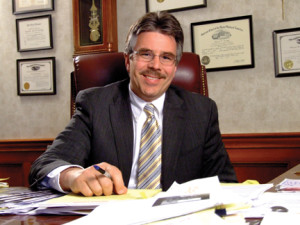
By Kaye Burnet and Julian Routh | The Duquesne Duke
Just three weeks after learning he would not be heading to Harrisburg to sit on the Pennsylvania Supreme Court, law school Dean Ken Gormley leans back in his chair in his office and smiles.
“I have learned not to spend my life thinking of things that might have happened,” Gormley says.
Gormley, a 59 year-old Democrat, was nominated Feb. 4 by Governor Tom Wolf alongside Republican Thomas Kistler to fill two vacancies on the court through the end of the year. It was well known that Gormley and Kistler were a “package deal,” according to Gormley.
However, Kistler withdrew his nomination Feb. 23 amid controversy over a racially-tinged email he forwarded to his staff in 2013.
As a result, Wolf and the state Senate decided not to pursue Gormley’s nomination, citing problems with an even-numbered, six member court.
Gormley said he was well aware of this possibility.
“I understood what was likely to happen after [Kistler’s announcement],” Gormley said. “I knew from day one … it was made very clear that the only way this way going to happen was that there would be one Democrat and one Republican.”
Wolf, a Democrat, originally bargained with a Republican-controlled Senate to appoint Gormley and Kistler as a bipartisan pair. The nominees were to fill two seats left open by the retirement of former Chief Justice Ronald Castille, who reached the mandatory retirement age of 70, and the resignation of Seamus McCaffery following a scandal regarding pornographic emails.
The timing of Kistler’s withdrawal prevented the Governor and Senate from nominating another Republican candidate. Senate Minority Leader Jay Costa (D-Forest Hills) said the Senate wanted the two justices to be confirmed by March 9 so they could hear the full schedule of the 2015 court cycle. Otherwise, “you would have justices sitting for only part of the year,” Costa said.
Gormley faced controversy himself in mid-February, when an anonymous individual sent an internal Duquesne report to members of the Senate Judiciary Committee that contained various allegations against the law school dean. The report detailed allegations of harassment and discrimination, arising from a tenure quest.
Duquesne spokeswoman Bridget Fare said in a written statement that the report in question was dismissed by the Equal Employment Opportunity Commission.
“The document in question, dating back eight years, was rejected by the University after a careful review by its own General Counsel as well as by outside legal counsel, both of whom concluded that its contents were incorrect as a matter of fact and law,” Fare said.
Costa said the allegations played no role in the Senate’s decision.
“There’s no question Dean Gormley would have been confirmed by Senate and would have been able to sit on the Supreme Court,” Costa said. “The distractions that arose in the process had no bearing on how people felt about Ken.”
Without Gormley and Kistler, the court will proceed with five members until the general election in November. State Supreme Court Chief Justice Thomas Saylor said the court will function smoothly until then.
“Our caseload is very current,” Saylor said, “and we’re all experienced justices.”
Saylor was not involved in the nomination or approval process, but said he would have enjoyed working with Gormley, whom he called “a friend.”
Gormley said the process, though unsuccessful, was a useful learning experience.
After his nomination, Gormley began the whirlwind process of reaching out to all 50 state senators to get their approval and address their concerns.
Gormley’s nomination was a result of strong support from local politicians close to the Governor, including Costa, Allegheny County Executive Rich Fitzgerald and Pittsburgh Mayor Bill Peduto.
“[The local politicians] thought it would be good for me,” Gormley said. “They thought it would be good for Duquesne, they thought it would be good for Western Pennsylvania.”
Fitzgerald first met Gormley when he was mayor of Forest Hills from 1998 to 2001.
“His temperament is very reasoned,” Fitzgerald said. “He can handle complex issues, and he has a very good mind for serving.”
Gormley was prepared to make a smooth transition to the court, and had the approval of Duquesne President Charles Dougherty.
“He was very supportive of letting me take a leave of absence,” Gormley said of Dougherty.
According to Gormley, the Supreme Court position would have given him a chance to become a better law teacher and to serve others. He said the Duquesne law school emphasizes public service as an important priority for its graduates.
“It’s a sense that it’s part of what you should be doing as a lawyer,” Gormley said.
Gormley worked as a clerk for Chief Justice Ralph Cappy before becoming dean. He was also nominated for the Pennsylvania Commonwealth Court in 2008 under former Governor Ed Rendell, but was never confirmed.



